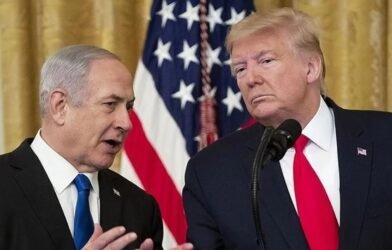Subtotal $0.00
Dr.. Dr. Mohamed Makram Balaawi
President of the Asia-Middle East Forum
Israeli Prime Minister and war crimes suspect Benjamin Netanyahu has arrived in the United States, becoming the first foreign leader to meet with new U.S. President Donald Trump. Netanyahu's visit comes after a resounding defeat in the Gaza Strip and against the backdrop of a deeply divided Israeli society - not only because of the disastrous outcome of the war against Hamas and the growing divide between secular and ultra-religious Israelis, but mainly because Netanyahu deceived the public and blamed his failures on others, including Israel's sacred institution, the IDF.
What are the consequences of a meeting between Netanyahu and Trump? Netanyahu is hated, and Trump values personal loyalty in his diplomacy. He has publicly stated that Netanyahu betrayed him after losing the last presidential election, and he will not forget or forgive him. However, pro-Israel donors like Miriam Adelson, along with the pro-Israel lobby, exert significant influence on Trump's regional decisions. Therefore, even if the meeting is tense, Trump is seeking to show the pro-Israel lobby and Israelis in general that he prioritizes their interests over their beleaguered prime minister.
The fragile Arab situation is in disarray. Some of the most influential Arab states on the Palestinian issue, such as Egypt and Jordan, rely on U.S. financial aid, while others - such as the Gulf states - rely on U.S. military support. The psychologically defeated official Palestinian leadership is collaborating with the Israeli occupation to fight its own people in Jenin and other West Bank cities instead of putting an end to attacks by illegal Jewish settlers. Mahmoud Abbas, who talks about imposing law and order in the West Bank, was begging the United Nations to protect the Palestinian people under his jurisdiction (from Israel and its settler attacks).
All these factors make it easy for Trump to sacrifice the Palestinian people on the altar of his ego and personal interests. In the end, who will hold him accountable? The bully mentality that drives his actions pushes him to flex his muscles in front of the weak and back down when there is a price to pay.
His brazen attempt to extort a trillion dollars from Saudi Arabia for his first foreign visit, along with his threats to US allies such as Canada and European countries to seize their territories, reflect a desperate gangster-like politics. No one is immune to his reckless policies and crude intimidation. Pent-up anger against America is growing - not only in Russia and China, but also in North America, including Canada and Mexico, in Europe, and even within Arab countries.
The right question might be: What do Netanyahu and his supporters expect from Trump? Many Israelis are disgruntled with the ceasefire agreement with Hamas, achieved after Trump pressured Netanyahu, and are now looking for some form of compensation. They realize that U.S. presidents, especially Trump, pay little attention to the United Nations or international law and act as they please. So, offering the right incentives will likely lead to the fulfillment of Israel's ambitions. Trump has a track record in this area, moving the US embassy to Jerusalem and recognizing the legitimacy of Israel's occupation of the Syrian Golan Heights, despite UN resolutions to the contrary.
What more do they expect from him? Their three main demands center around solidifying their role as purported regional leaders, (through):
First, they seek his help in normalizing relations with major Muslim countries such as Indonesia and Pakistan, as this is a necessary step before achieving their ultimate diplomatic goal: normalizing relations with Saudi Arabia. Second, they want to isolate Iran through the "maximum pressure" campaign, punish the Houthis, and finally realize their age-old dream of turning Palestine into a "Jewish state" by ethnically cleansing the Palestinians, not only from the Gaza Strip, but also from the West Bank.
All of these goals may not be immediately achievable, given the complexity of regional dynamics and the shifting nature of international alliances. Nevertheless, Netanyahu will be heavily focused on securing at least a strong promise, if not a detailed roadmap, from Trump to move these goals forward. Obtaining a commitment, even if only verbal, would give Netanyahu political leverage at home, allowing him to present the illusion of progress to his supporters and divert attention from his failures.
However, when it comes to Trump, nothing is certain. The Palestinians may not be the easy target he envisions, and Arab states may see his maneuvers as an existential threat and decide to resist his agenda. Trump's unpredictable behavior and his tendency to act according to his personal interests or shifting political currents means that any commitments he makes can be quickly reversed. It would not be surprising if Trump suddenly changed course and reneged on his promises, leaving Netanyahu's ambitious plans in tatters. With a long track record of interest-based dealings, Trump has a habit of abandoning allies when they no longer serve his goals. Despite his political savvy, Netanyahu risks becoming another victim of this recurring pattern.
In the end, this is often the fate of those who rely on others to do their dirty work. Relying on outside forces, especially those as fickle as Trump, is a dangerous gamble that could turn Netanyahu's dreams into ashes, serving as a harsh reminder of the dangers of over-reliance on unreliable allies.
- The article is translated from English and was originally published on the Middle East Monitor website.











